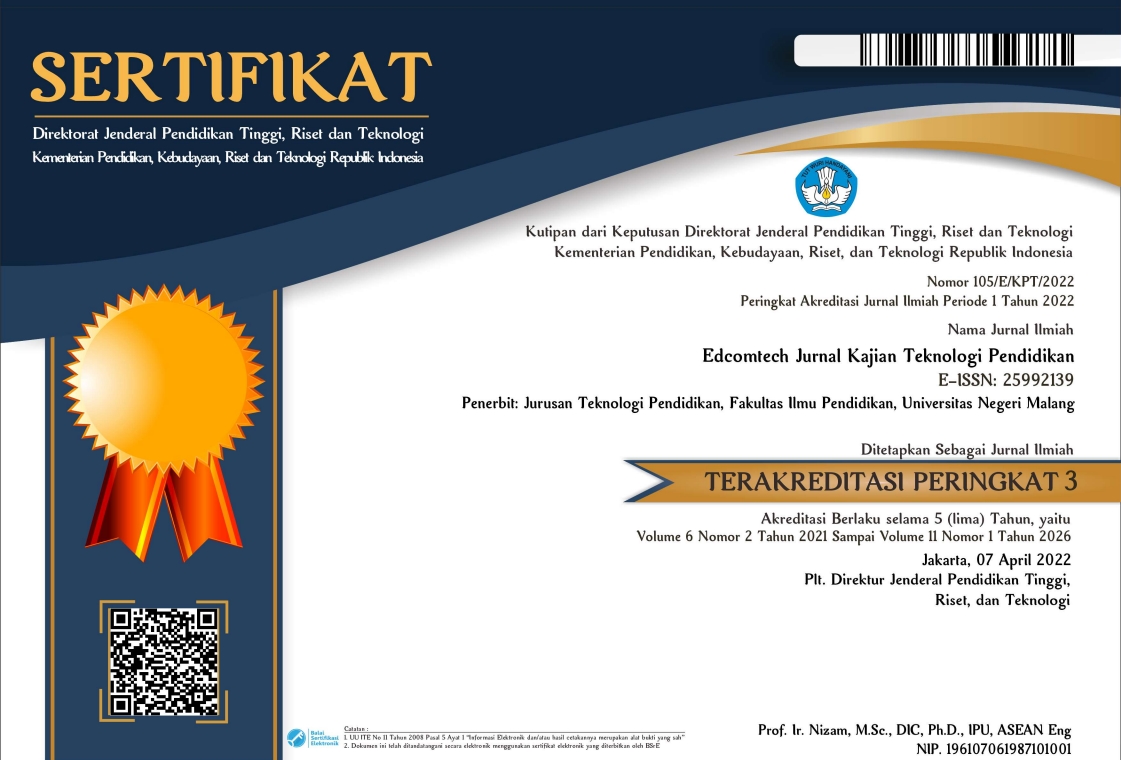Eksplorasi Persepsi Siswa Sekolah Dasar dalam Pembelajaran Huruf Hijaiyah Berbasis Permainan
Abstract
Abstract: In this digital era, children are more interested in playing games on their smartphones until the phenomenon of game addiction arises, rather than having to read Iqro let alone the Qur’an. Researchers aimed to determine the perception of the use of mobile game base learning in learning hijaiyah letters. In this study using a quantitative method with a descriptive approach. The technique used in data collection uses survey techniques through questionnaires. The questionnaire was developed using TAM (Technology Acceptance Model). Based on the results obtained, the usefulness and ease of mobile game-based learning hijaiyah is believed to improve the ability to read hijaiyah letters and be acceptable to respondents. Respondents intend to reuse mobile game based learning in the future. This research can be a reference or contribution about TAM (Technology Acceptance Model) on using mobile game based learning hijaiyah.
Keywords
Full Text:
PDFReferences
Akhtar, H., Hasanati, N., & Istiqomah. (2019). Game-Based Learning: Teachers’ Attitude and Intention To Use Quizizz in the Learning Process. The 2nd International Conference on Educational Assessment and Policy, Iceap, 49–54.
Al-Azawei, A., Parslow, P., & Lundqvist, K. (2017). Investigating the effect of learning styles in a blended e-learning system: An extension of the technology acceptance model (TAM). Australasian Journal of Educational Technology, 33(2), 1–23. https://doi.org/10.14742/ajet.2741
Azizah, siti tutik muntianah; endang siti astuti;devi farah. (2012). Pengaruh minat perilaku terhadap. Profit, 6(1), 88–113.
Cahyana, U., Paristiowati, M., Savitri, D. A., & Hasyrin, S. N. (2017). Developing and application of mobile game based learning (M-GBL) for high school students performance in chemistry. Eurasia Journal of Mathematics, Science and Technology Education, 13(10), 7037–7047. https://doi.org/10.12973/ejmste/78728
Chang, C. C., Warden, C. A., Liang, C., & Lin, G. Y. (2018). Effects of digital game-based learning on achievement, flow and overall cognitive load. Australasian Journal of Educational Technology, 34(4), 155–167. https://doi.org/10.14742/ajet.2961
Cheng, Y. M., Lou, S. J., Kuo, S. H., & Shih, R. C. (2013). Investigating elementary school students’ technology acceptance by applying digital game-based learning to environmental education. Australasian Journal of Educational Technology, 29(1), 96–110. https://doi.org/10.14742/ajet.65
Christina, H. (2018). Analisis Penerimaan dan Penggunaan Teknologi Ojek Online. 6(1), 34–44.
Fauzi, A., Widodo, T., & Djatmiko, T. (2018). Pengaruh Behavioral Intention Terhadap Use Behavior Pada Penggunaan Aplikasi Transportasi Online (Studi Kasus Pada Pengguna Go-Jek Dan Grab Di Kalangan Mahasiswa Telkom University ). E-Proceeding of Management, 5, no.2(October), 1195–1200.
Fontil, V., Radcliffe, K., Lyson, H. C., Ratanawongsa, N., Lyles, C., Tuot, D., Yuen, K., & Sarkar, U. (2019). Testing and improving the acceptability of a web-based platform for collective intelligence to improve diagnostic accuracy in primary care clinics. JAMIA Open, 2(1), 40–48. https://doi.org/10.1093/jamiaopen/ooy058
Gamlo, N. (2019). The Impact of Mobile Game-Based Language Learning Apps on EFL Learners’ Motivation. English Language Teaching, 12(4), 49–56. https://doi.org/10.5539/elt.v12n4p49
Ghozali, I. (2011). Aplikasi analisis multivariate dengan program IBM SPSS 19. Badan Penerbit Universitas Diponegoro, 68.
Hidayatulloh, S., Praherdhiono, H., & Wedi, A. (2020). Pengaruh Game Pembelajaran Terhadap Peningkatan Hasil Belajar Pemahaman Ilmu Pengetahuan Alam. JKTP: Jurnal Kajian Teknologi Pendidikan, 3(2), 199–206. https://doi.org/10.17977/um038v3i22020p199
Holahan, P. J., Lesselroth, B. J., Adams, K., Wang, K., & Church, V. (2015). Beyond technology acceptance to effective technology use: A parsimonious and actionable model. Journal of the American Medical Informatics Association, 22(3), 718–729. https://doi.org/10.1093/jamia/ocu043
Huang, Y. L., Chang, D. F., & Wu, B. (2017). Mobile game-based learning with a mobile app: Motivational effects and learning performance. Journal of Advanced Computational Intelligence and Intelligent Informatics, 21(6), 963–970. https://doi.org/10.20965/jaciii.2017.p0963
Jahangir, N., & Begum, N. (2008). The role of perceived usefulness, perceived ease of use, security and privacy, and customer attitude to engender customer adaptation in the context of electronic banking. African Journal of Business Management, 2(2), 32–40.
Latifa, U. (2017). Aspek Perkembangan pada Anak Sekolah Dasar : Masalah dan Perkembangannya. Journal of Multidisciplinary Studies, 1(2), 185–196.
Liu, E. Z. F., & Chen, P.-K. (2013). The Effect of Game-Based Learning on Students’ Learning Performance in Science Learning – A Case of “Conveyance Go.” Procedia - Social and Behavioral Sciences, 103, 1044–1051. https://doi.org/10.1016/j.sbspro.2013.10.430
Plass, J. L., Homer, B. D., & Kinzer, C. K. (2015). Foundations of Game-Based Learning. Educational Psychologist, 50(4), 258–283. https://doi.org/10.1080/00461520.2015.1122533
Qonita, A., Sulton, S., & Soepriyanto, Y. (2019). Persepsi kegunaan, persepsi kemudahan dan aksesibilitas mahasiswa fakultas ilmu pendidikan angkatan 2018 terhadap penerapan sipejar menggunakan model tam (technology acceptance model). In Jurnal Kajian Teknologi Pendidikan (pp. 140–148). State University of Malang (UM). https://doi.org/10.17977/um038v2i22019p140
Rahmawati N; Narsa, I Made, R. (2019). http://journal.uny.ac.id/index.php/jitp. 6(2), 127–136.
Shiue, Y. M., & Hsu, Y. C. (2017). Understanding factors that affecting continuance usage intention of game-based learning in the context of collaborative learning. Eurasia Journal of Mathematics, Science and Technology Education, 13(10), 6445–6455. https://doi.org/10.12973/ejmste/77949
Sugiyono. (2015). Metode Penelitian Kuantitatif, Kualitatif dan R&D. Penerbit Alfabeta. file:///C:/Users/HP/AppData/Local/Mendeley Ltd./Mendeley Desktop/Downloaded/Sugiyono - 2015 - Metode Penelitian Kuantitatif, Kualitatif dan R&D.pdf
Surahman, E., & Alfindasari, D. (2017). Developing adaptive mobile learning with the principle of coherence Mayer on biology subjects of high school to support the open and distance education. 3rd International Conference on Education and Training (ICET 2017). Atlantis Press, 184–190.
To, W. M., Lai, L. S. L., & Leung, V. W. S. (2019). Technology acceptance model for the intention to use advanced business application software among Chinese business school students. Australasian Journal of Educational Technology, 35(4), 160–173. https://doi.org/10.14742/ajet.4942
Tsai, C. H., Cheng, C. H., Yeh, D. Y., & Lin, S. Y. (2017). Can learning motivation predict learning achievement? A case study of a mobile game-based English learning approach. Education and Information Technologies, 22(5), 2159–2173. https://doi.org/10.1007/s10639-016-9542-5
Ulfa, S. (2017). Exploring Studentâ €TM s Perceptions of Computer based Testing for University Entrance Examination By Using Technology Acceptance Model : Case Study State University of Exploring Student ’ s Perceptions of Computer based Testing for University Entrance Exa. 8(2), 0–8.
Ulfa, S., Fattawi, I., Surahman, E., & Yusuke, H. (2019). Investigating Learners’ Perception of Learning Analytics Dashboard to Improve Learning Interaction in Online Learning System. 2019 5th International Conference on Education and Technology (ICET), 49–54. https://doi.org/10.1109/ICET48172.2019.8987229
Ulfa, S., Surahman, E., & Octaviani, H. I. (2020). Mobile Seamless Language Learning Framework to Improving Students’ Speaking Skills for Junior High Students during Pandemic Convid-19: A Case Study in Indonesian Context. 1st International Conference on Information Technology and Education (ICITE 2020), 497–500.
Vu, P., & Feinstein, S. (2017). An Exploratory Multiple Case Study about Using Game-Based Learning in STEM Classrooms. International Journal of Research in Education and Science, 3(2), 582–588. https://doi.org/10.21890/ijres.328087
Wang, C. S., Huang, Y. M., & Hsu, K. S. (2017). Developing a mobile game to support students in learning color mixing in design education. Advances in Mechanical Engineering, 9(2), 1–6. https://doi.org/10.1177/1687814016685226
White, K., & McCoy, L. P. (2019). Effects of Game-Based Learning on Attitude and Achievement in Elementary Mathematics. Networks: An Online Journal for Teacher Research, 21(1), 1–17. https://doi.org/10.4148/2470-6353.1259
Zaini, M., & Soenarto, S. (2019). Persepsi Orangtua Terhadap Hadirnya Era Teknologi Digital di Kalangan Anak Usia Dini. Jurnal Obsesi : Jurnal Pendidikan Anak Usia Dini, 3(1), 254–264. https://doi.org/10.31004/obsesi.v3i1.127
DOI: http://dx.doi.org/10.17977/um039v6i12021p210
Refbacks
- There are currently no refbacks.
Copyright (c) 2021 HURRIATUS TSANIYAH QUTBY

This work is licensed under a Creative Commons Attribution-ShareAlike 4.0 International License.
Edcomtech: Jurnal Kajian Teknologi Pendidikan published by Department of Educational Technology, Faculty of Education, State University of Malang in Collaboration with Asosiasi Program Studi Teknologi Pendidikan Indonesia (APS TPI) and Ikatan Profesi Teknologi Pendidikan Indonesia (IPTPI) with MoU.
Publisher Address:
Lab. Teknologi Pendidikan, Gd.E2, Lt.1
Fakultas Ilmu Pendidikan Universitas Negeri Malang
Jalan Semarang No 5, Kota Malang Kode Pos 65145
Email: edcomtech.fip@um.ac.id
========================================================================================================
| INDEXED BY | TOOLS | PLAGIARISM CHECK | ARTICLE TEMPLATE |
|

Edcomtech is licensed under a Creative Commons Attribution-ShareAlike 4.0 International License.
Edcomtech Statistics (Since July 13th, 2020)












1.png)








